#pierre i de bretagne
Photo
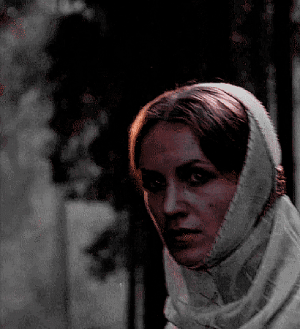
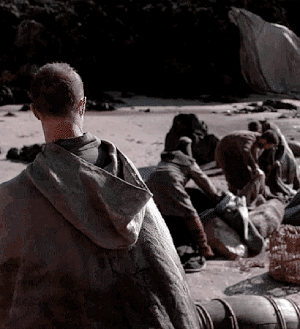


The Duchess therefore ruled Brittany, with or without a husband, from 1181 to 1201. An episode of her reign illustrates well the way in which the Duke of Brittany cooperated with the Plantagenet regime for maritime issues. It is delivered to us by a letter from the Duchess Constance addressed to Pierre Bertin, Senechal of Poitou, from around 1190. It mentions the outcome of a dispute caused by a shipwreck at Belle-Île. The Abbot of Sainte-Croix de Quimperlé contested the Right of the Wreck to a certain Geoffroi of Le Mans, "de Cenoman”, and to his associates- merchants from La Rochelle, it seems. Belle-Île being under the jurisdiction of the continental lands of Brittany, the Duchess Constance delegated the care of settling the dispute to her Senechal du Broërec. The latter ruled that the abbot had only the Right of the Wreck, by endowment from the duke, which had to be perfectly attested, thanks to the procedures and acts exchanged by the abbeys of Quimperlé and Redon earlier in the century. But Geoffrey of Le Mans did not bow to this judgment. Leaving aside the legal acts in question, Constance orders Pierre Bertin, in this letter, not to take any action against his men or those of the abbot, as she strives to satisfy both parties. How could the Duchess give orders to the Senechal de Poitou in this way? By what authority? It remains unclear. The compelling language Constance uses in this letter may be thought to be essentially emphatic and aimed at enhancing her personal prestige. But this document illustrates very well a crucial point: the importance of harmonious cooperation in this region. The Duchess of Brittany and the Senechal du Poitou, who in fact assumed the functions of viceroy, in the absence of Richard I, are proof that they could coordinate their exchanges with the merchants, to spare a solution that was unfair or arbitrary to those involved in maritime trade.
-Judith Everard, Le duché de Bretagne et la politique Plantagenêt aux XIIe et XIIIe siècles : perspective maritime
98 notes
·
View notes
Link
0 notes
Text
Thibaut le Chansonnier.
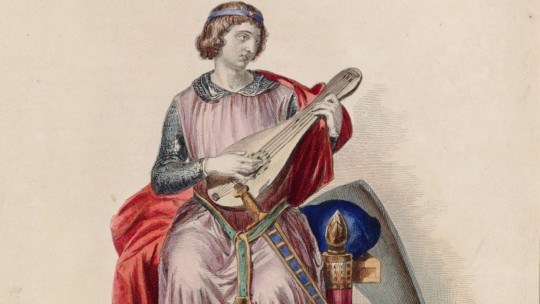
The present count of Champagne, Thibaut IV, is a poet. Guarded through his minority by his capable mother, Blanche of Navarre, Thibaut grew up to marry, one after the other, a Hapsburg, a Beaujeu, and a Bourbon princess, by whom he had eight children. To these children he added four more, products of his numerous love affairs. But the enduring passion of his life was a chaste one, owing to the inaccessibility of its object, the queen of France. This lady, Blanche of Castile, wife and widow of Louis VIII and mother of Louis IX (St.-Louis), was a dozen years Thibaut’s senior. Nevertheless Thibaut’s penchant for Blanche was such that he was suspected of poisoning her husband when the king died suddenly. The injustice of the accusation provoked Thibaut to join a couple of baronial troublemakers, Hugo of La Marche and Peter of Brittany, in a sort of antiroyal civil war. When on sober second thought Thibaut changed his mind, Hugo and Peter turned their spite against him and invaded Champagne, setting haystacks and hovels ablaze. Stopped by the walls of Troyes, they were forced to turn around and go home when a relieving force arrived, sent by Queen Blanche.
Partly as a result of the war, Thibaut was constrained to sell three of his cities—Blois, Chartres and Sancerre—to the king of France. At the last moment he felt a reluctance to hand over Blois, cradle of his dynasty, and carried stubbornness to the point of courting a royal invasion. But forty-six-year-old Blanche of Castile dissuaded thirty-three-year-old Thibaut in an interview of which the dialogue was recorded, or at least reported, by a chronicler:
Blanche: Pardieu, Count Thibaut, you ought to have remembered the kindness shown you by the king my son, who came to your aid, to save your land from the barons of France when they would have set fire to it all and laid it in ashes.
Thibaut (overcome by the queen’s beauty and virtue): By my faith, madame, my heart and my body and all my land is at your command, and there is nothing which to please you I would not readily do; and against you or yours, please God, I will never go.
Thibaut’s fancy for Blanche needed sublimation. Sage counselors recommended a study of canzonets for the viol, as a result of which Thibaut soon began turning out “the most beautiful canzonets anyone had ever heard” (a judgment in which a later day concurs). The verses of Thibaut the Songwriter were sung by trouvères and jongleurs throughout Europe. A favorite:
Las! Si j’avois pouvoir d’oublier
Sa beauté, a beauté, son bien dire,
Et son très-doux, très-doux regarder,
Finirois mon martyre.
Mais las! mon coeur je n’en puis ôter,
Et grand affolage
M’est d’espérer:
Mais tel servage
Donne courage
A tout endurer.
Et puis, comment, comment oublier
Sa beauté, sa beauté, son bien dire,
Et son très-doux, très-doux regarder?
Mieux aime mon martyre.
[Could I forget her gentle grace,
Her glance, her beauty’s sum,
Her voice from memory efface,
I’d end my martyrdom.
Her image from my heart I cannot tear;
To hope is vain;
I would despair,
But such a strain
Gives strength the pain
Of servitude to bear.
Then how forget her gentle grace,
Her glance, her beauty's sum,
Her voice from memory efface ?
I'll love my martyrdom.]
Frances & Joseph Gies- Life in a Medieval City
#xiii#frances & joseph gies#life in a medieval city#thibaut le chansonnier#thibaut iv de champagne#thibaut i de navarre#blanche de navarre#blanche de castille#louis viii#louis ix#hugues x de lusignan#pierre i de bretagne#pierre mauclerc#pierre de dreux
5 notes
·
View notes
Audio
Pierre Moulu (c.1480/90-c.1550)
Fiere attropos mauldicte et inhumaine (1514)
[(116v—119) I-Fl MS Acquisti e doni 666 (Medici Codex) Biblioteca Medicea-Laurenziana, Firenze (Florence), Italy]
Fiere attropos mauldicte et inhumaine,
Grant ennemye de toute vie humaine,
Tu nous as mis en grant perplecité
Quant per enuye as en tes pletz cité
Nostre maistresse et dame souveraine.
Que te nuysoit en ce siecle et demaine,
La noble dame dont France grant deul maine
Comme privé de sa félicité ?
/Tenor/
Anxiatus est in me spiritus meus;
in me turbatum est cor meum.
Antoine De Févin – Requiem D'Anne De Bretagne
Doulce Mémoire, Denis Raisin Dadre
(2011, Zig Zag Territoires – ZZT110501)
youtube
9 notes
·
View notes
Text
A Biography of Marshal Ney (Part 1)
The French Senate has published quite a lot about Marshal Ney, something I just discovered a couple of days ago. All of it is in French. There is a biography in several sections, the first of which I have translated here. If there is sufficient interest, I will try to translate the next sections over the next few days.
If anybody knows anything about La Malgrange, I would be most interested.
De ses origines modestes à sa brillante ascension dans l’armée pendant la Révolution et le Consulat (1789-1804)
Né le 10 janvier 1769 à Sarrelouis, ville de garnison rattachée à la France en 1766, Michel Ney est le second fils d'un tonnelier, Pierre Ney, ancien soldat de la guerre de Sept ans. Sa formation initiale est incomplète. Il quitte en effet le collège des Augustins dès l’âge de treize ans pour travailler comme commis aux écritures chez un notaire, puis au parquet du procureur du roi. Constatant son manque d’intérêt pour le travail de bureau, son père le fait embaucher comme surveillant aux mines de Salek puis aux mines d'Apenweiler. Cette vie sédentaire ne lui convient guère plus. Il est en effet attiré par la carrière des armes : à dix-neuf ans, il s’engage à Metz dans un régiment de hussards.
Compte tenu de ses origines modestes, les perspectives sont alors peu prometteuses pour lui dans l’armée. Son père n’a jamais dépassé le grade de sergent. Humble, de surcroît, il hésite à plusieurs reprises avant d’accepter un grade supérieur, prétendant ne pas l’avoir assez mérité. Pourtant, brigadier fourrier en 1791, sous-lieutenant en 1792, son courage sur les champs de bataille le fait repérer par Kléber et lui fait gravir rapidement les échelons : il est nommé colonel en 1794 et, sous le Directoire, général de brigade à vingt-sept ans (1796) puis général de division en mars 1799 à la demande de Bernadotte.
Il passe successivement sous le commandement de Kléber, Hoche, Jourdan, puis Moreau qui commande l’armée du Rhin-et-Moselle. Sous les ordres de ce dernier, il contribue à mettre fin aux guerres de la Révolution, en remportant la bataille de Hohenlinden, le 3 décembre 1800, pour laquelle il propose un plan de type nouveau : attendre l’ennemi en se camouflant dans la forêt de Hohenlinden. Aidé de Richepanse, c’est un succès total pour Moreau et un échec cuisant pour les Autrichiens. Deux mois plus tard, en 1801, le traité de Lunéville est signé entre la France et l’Autriche et Michel Ney regagne sa propriété de la Malgrange, au moment où Bonaparte relève les généraux de l’armée du Rhin de leur commandement.
C’est à cette époque qu’il rencontre le général Bonaparte par l’intermédiaire de Berthier et que lui est présentée, par celui de Joséphine de Beauharnais, Aglaé Auguié de Lascans, jeune femme de treize ans sa cadette. Le mariage a lieu en août 1802. Bonaparte n’y aurait pas assisté mais aurait offert un magnifique sabre pour l’occasion, celui qui trahira en juillet 1815 le maréchal caché dans le château de Bessonis.
Quelques mois plus tard, Bonaparte l’envoie en Suisse rétablir la paix, avec succès. Il y reste deux années et y rencontre Henri Jomini, un spécialiste d’histoire militaire qui deviendra son aide de camp et proche conseiller.
Malgré la paix d’Amiens signée en 1802 entre la France et la Grande-Bretagne, la guerre reprend dès 1803, ce qui vaut à Ney d’être nommé commandant du camp de Montreuil-sur-Mer au début de 1804, dans le cadre de la préparation du débarquement en Angleterre, qui n’a finalement pas lieu.
Le 18 mai 1804, Napoléon est proclamé empereur par le Sénat, sous le nom de Napoléon Ier. Il élève Ney à la dignité de maréchal d’Empire, avec dix-sept autres généraux. Mi-juillet 1805, Napoléon le fait également grand officier de la Légion d’honneur.
https://www.senat.fr/evenement/archives/D26/le_marechal_ney/de_ses_origines_modestes_a_sa_brillante_ascension_dans_larmee_pendant_la_revolution_et_le_consulat_1789_1804.html
From his modest origins to his brilliant rise in the army during the Revolution and the Consulate (1789-1804)
Born on January 10, 1769 in Sarrelouis, a garrison town attached to France in 1766, Michel Ney was the second son of a cooper, Pierre Ney, a former soldier during the Seven Years' War. His early education was incomplete. He left the Augustins College at the age of thirteen to work as a clerk for a notary and then for the King's prosecutor. Seeing his lack of interest in office work, his father had him hired as a supervisor at the mines of Salek and then at the mines of Apenweiler. This sedentary life did not suit him any better. Ney was attracted to a career in the army: at the age of nineteen, he enlisted in Metz in a hussar regiment.
Given his modest origins, prospects were not very promising for him in the army. His father never rose above the rank of sergeant. Humble, moreover, he hesitated several times before accepting a higher rank, claiming not to have earned it enough.
However, already a sous-lieutenant in 1792, his courage on the battlefields drew the attention of Kléber and allowed him to rise rapidly through the ranks: he was promoted to colonel in 1794 and, under the Directoire, to brigadier general at the age of 27 (1796) and then to division general in March 1799 at the request of Bernadotte.
He was successively under the command of Kléber, Hoche, Jourdan, then Moreau, who commanded the Army of the Rhine and Moselle. Under Moreau's orders, he contributed to putting an end to the wars of the Revolution by winning the battle of Hohenlinden, on 3 December 1800, for which he proposed a new type of plan: to wait for the enemy by camouflaging the troops in the Hohenlinden forest. With the help of Richepanse, it was a complete success for Moreau and a bitter failure for the Austrians. Two months later, in 1801, the treaty of Lunéville was signed between France and Austria and Michel Ney returned to his property at La Malgrange, just as Bonaparte relieved the generals of the army of the Rhine of their command.
It was at this time that he met General Bonaparte through Berthier and was introduced to Aglaé Auguié de Lascans, a young woman thirteen years his junior, through Joséphine de Beauharnais. The marriage took place in August 1802. Bonaparte did not attend but offered a magnificent sword for the occasion, the one that would betray the Marshal in July 1815, when he was in hiding at the Château de Bessonis.
A few months later, Bonaparte sent Ney to Switzerland to restore peace, which he did successfully. He stayed there for two years and met Henri Jomini, a specialist in military history who became his aide-de-camp and close adviser.
Despite the Peace of Amiens signed in 1802 between France and Great Britain, the war resumed in 1803, which led to Ney being appointed commander of the Montreuil-sur-Mer camp at the beginning of 1804, as part of the preparations for the landing in England, which ultimately did not take place.
On 18 May 1804, Napoleon was proclaimed Emperor by the Senate, under the name of Napoleon I. He raised Ney to the dignity of Marshal of the Empire, along with seventeen other generals. In mid-July 1805, Napoleon also made him a Grand Officer of the Legion of Honour.
13 notes
·
View notes
Photo
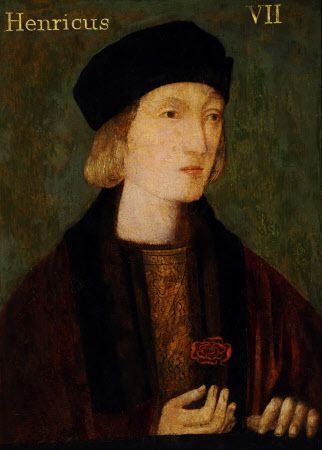
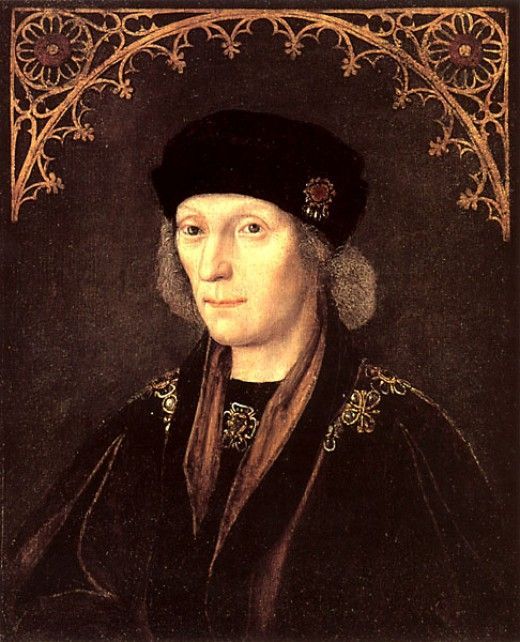
~HENRY TUDOR: A SOCIOLOGICAL INTERPRETATION.~
Today, I'll be discussing a character who left his mark in History, fathering a dynasty whose most proeminent members were his (second) son Henry VIII and his granddaughter Elizabeth I. Often overshadowed by his descendants, Henry's own deeds as a king and as an individual of his own days have been neglected until recently, when efforts from British historians have been working hard to change that.
The reason why I decided to bring him here was not only due to personal affections, though they certainly helped it, but because there are aspects overlapped in social structures that shaped him. In other words: what's Henry Tudor as a sociological individual? Can we point him out as a constant foreigner or someone whose socialization process were strongly marked by the addition of two different societies?
Henry Tudor was born in Pembroke, located in Wales, in January 28th 1457. His mother was Margaret Beaufort, a proeminent lady whose grandfather John Beaufort was the son of John of Gaunt, son in turn of King Edward III of England. The duke of Lancaster fathered four ilegitimated children (who were legitimated in posterity) by his (third marriage to his then) lover Katheryn Swynford, amongst whom John Beaufort was the oldest. Therefore, Henry was 3x grandson. to the duke and, despite what some might argue when Henry IV became king, in great deal to inherite the throne. Well, it's not my intention to deepen the discussion as to Henry's legitimacy or the Beauforts.
Though his father's ancestry, Henry's blood led him to the royal house of Valois. His paternal grandmother, Katherine de Valois, was the sister of Isabella, who had been the second wife of the ill-fated king Richard II. She was also descended of Louis IX and his spanish wife, Blanche de Castille. Henry was also a royal man from the Welsh lands, as Owain Tudor, his grandfather, was related to several princes of Wales. By all these I said, the first thing one might think (considering 15th century and it’s nobility) Henry would receive a proper education due to his status. However, this would not happen in the strict sense of the word. Let us not forget that England was collapsing by the time of Henry Tudor's birth and his childhood. Why am I using the word 'collapse' to qualify the civil war we know named as wars of the roses?
Émile Durkheim, a french sociologist, would write several centuries later, about how a society is formed: he compared it to the working of a human body. If the head, the brain of our body does not work well, what happens? The body will not work well, certainly. Neither would the head work well if other parts hurt somehow. Although if you did break a leg, you could still make use of your brain, but as a whole how limited wouldn't you be? He'd also say that when the human body, or as he called, the society was sick, it was because of the social structures which imposed the human being to the point where there would be no individuality, no matter of choice.
Such created social facts that were completely external (althoug well internalized through means of a process we call socialization) but coercitive. If they are not working, what does this mean? That soon another social facts will be replacing the former one. But between one and another, we have a "very sickly" society. Taking this understanding back to England's 15th century, it is not difficult to see what Durkheim was talking about.
The king was the head of the English body. If we have here two kings fighting over one crown, fighting over the rule of an entire body... Well, then? We have the collapse, a civil war that lasted for the next 30 years. Here, it's less about discussing who started what but why they did what they did, and the explanation for it. Power is power. It's crystal clear, and a statement that, however simple might it sound, points to the obvious. Factions that fought for power intended to dominate others, using the concept very well developed by sociologists as Pierre Bourdieu and Norbert Elias. This domination is a large field, a concept that embrace all sorts of it. Looking back to England's latter half of the century, domination was peril. The head was about to explode. The society was ill... and dominated by it.
What were the values? What was the racionalization proccess of social action led by individuals that were not only individuals but a group? How would all of this affect Henry Tudor? It was not about merely blaming the capitalism, because such coercitive system wasn't present yet. But Henry was, directly or not, linked to the royal house of Plantagenets, whose eagerness for dominating one another and by extension the rest of the country would include him in the game.
"Game." For Durkheim, this would imply an agitation, like a wave of sea, from which no one could escape from. Let's not forget that Institutions created ideas, renewed them, shaped them to the practice whether to dominate the weaker or to defeat the stronger. Whatever the purpose, we here have the Church, not the religiosity, but the precursor of ideas would subdue individuals to share (or manipulate to their own goals anyways) values in order to keep determined mentality to it. But also, monarchy was too an institution which held control over the lives and deaths of thousands of people. A monarch, as we know, is never alone regardless of how "absolut" they could be in different times and contexts. They were not above the law, either. At least where the socialization process is concerned. For the monarch embodied the content which was the law back then. He was literally the law.
Furthermore, Henry's education would foresee this fighting, which I'm not merely referring to custody going from his mother to another, before finally staying under his uncle's responsibilities, as well as the civil war itself. (Anyone remembers Warwick executing Herbert before the boy?)
See, we all know and comprehend today what trauma are capable of doing to someone. Such experience is the main responsible for shaping ideas, values and even costumes. Now, a society which is very much sick by it's own values and moral costumes (a point here must be made: the public consciousness always preached for a warrior, strong king, but has no one thought how this "common sense", validated by a general expectation towards the head of society, was what led it to... well, for the lack of better word, suicide itself?
For it's widely accepted that weak kings do not last long. But that is when we deal with a good deal of expectations that, when turned to frustrations, bring awful results. If England's society was ill in it's very extreme sense of the word, was because the values they created turned against themselves and that would leave it's mark in a boy as Henry. And until the age of 14, he was still absorbing these concepts, these morals, values, costumes from institutions (let's not forget that a monarch shares such with the nobility that surrounds him, as was the case of House Lancaster,f.e) before he was casted out to Bretagne and, in posteriority, to France. Now, I believe you all know what was done whether in England or with our king during these 14 years spent outside his own country before he became king upon the victory settled on the battle of Bosworth field.
I am not interested in discussing historical facts. At least not now, as we are finally dealing with Henry Tudor as a social actor
----/-HENRY TUDOR: A FOREIGNER? AN EXILED? OR AN OUTCAST?--
These questions mobilized me as I came to read a text written by 19th century sociologist named Georg Simmel. He wrote an essay (pardon by any mistakes in translations done from here on) entitled "The Foreigner", in which he brings a sociological question at why foreigners are seen as strangers who are never entirely immersed in the society they attempt to be part in.
Here's an excerpt translated by me in which he explains it:
"Fixed within a determined social space, where it's constancy cross-border could be considered similar to the space, their position [the foreigner's] in it is largely determined by the fact of not belonging entirely to it, and their qualities cannot originate from it or come from it, nor even going in it." (SIMMEL, 2005: 1.)
Furthermore, he adds:
“The foreigner, however, is also an element of the group, no more different than the others and, at the same time, distincted from what we consider as the 'internal enemy'. They are an element in whose position imanent and of member comprehend, at the same time, one outsider and the other insider." (SIMMEL, 2005: 1).
Here's why Henry, as Earl of Richmond, was not well seen by the Britons and the French, in spite of being "accepted" by them. Never forget that he would still be seen as an outsider by his own fellows. As Richard III would call Henry a bastard, one could understand this accusation with sociological implications. English back then detested these foreigners and by the concept brought here by me from Simmel we can understand why. But we could also see being called a bastard as a way to point out Henry's localization. Where can the Earl of Richmond & soon-to-be king be located?
I have pointed this far the structures which were raised and caused a collapsed society to live broken in many, many ways and how this affected Henry this far. Seeing how foreigner he was, nonetheless, he did not belong neither to England (at first) nor to the Continent.
On that sense of word, says Simmel (2005: 3):
"A foreigner is seen and felt, then, from one side, as someone absolutely mobiled, a wanderer. As a subject who comes up every now and then through specific contacts and yet, singularly, does not find vinculated organically to anything or anyone, nominally, in regards to the established family, locals and profissionals”
Even though we find a dominant group of foreigners in France, as we are talking about of nobles displeased with the Yorkist cause and supporters of the Lancastrian House, they were not majority. Where can we locate Henry, then? We don't, because he was not a French and however well he could speak the language, it was not his birth language. The French culture was not passed nor naturalized by him through the teachings of a family or the church by the institutions: monarchy, church, family, parliament, etc; he would have been defeated a long time. But that he did manage to, using this popular expression, put things together and become the first king to die peacefully since Henry V, it tells us a lot. Not rarely an immigrant is accepted by a society whose demands are forced upon him, most of the times in aggressive ways. But it's not often either that we see a king occupying such place in society.
Indeed, one might say that kings as Henry II and the conquerors before him were too foreigners, but not in the sociological way I'm explaining. Because the social structures were different. Henry's government were settled in a more centralized ruling, far more just and peaceful, more economic and less concerned with waging wars than his antecessors. The need to migrate was not 'forced', neither 'imposed' and even back to the 11th and 12th centuries were motivated by different reasons. That's to accentuate how English society evolved throughout the centuries. And I used again and again Georg Simmel to prove my point about casting a sociological light towards Henry VII not as a historical character so distant of us and who remains an object of controversial discussions, but a man of his times who was forced to deal with expectations that placed him in social positions nearly opposed to one another to fulfill each role whether as king or as a man. For some reason, the broken society shaped Henry as an immigrant, but as history shows us, it was this immigrant who helped shape medieval society, directing it towards the age of Renaissance and in posteriority to Modern Age.
Finally, to close this thread I leave here another quote (translated to English by me) found in the text written by Simmel:
"The foreigner, strange to the group [he is in], is considered and seen as a non-belonging being, even if this individual is an organic member of the group whose uniform life comprehends every particular conditioning of this social [mean]. (...) [the foreigner] earns in certain groups of masses a proximity and distance that distinguishes quantities in each relationship, even in smaller portions. Where each marked relationship nduced to a mutual tension in specific relationships, strenghtening more formal relations out of respect to what's considered 'foreigner' of which are resulted." (SIMMEL, p 7).
Bibliography:
AMIN, Nathen. https://henrytudorsociety.com/
DURKHEIM, Émile. "The Division of Labor in Society”.
KANTOROWICZ, Ernst H.”The King’s Two Bodies: A Study in Medieavel Political Theology.”
PENN, Thomas. Winter King: Henry VII and the Dawn of Tudor England.
SIMMEL, Georg. The Foreigner. In: Soziologie. Untersuchungen über die Formen der Vergesellschaftung. Berlin. 1908.
#Henry VII#King Henry VII#Henry VII of England#sociology#socio-history#historical sociology#immigration#sociology of immigration#Henry Tudor#Tudor dynasty
29 notes
·
View notes
Photo

Seriously?! What is it going in people's brains? Who did this? I reminber the latest time I went there to visit, unexpecting organ was playing, goosebumps... Now it is not here anymore (such a lost from 16th Century)... Après Notre-Dame de Paris, la cathédrale Saint-Pierre-et-Saint-Paul de Nantes, Bretagne, en feu ce matin...
10 notes
·
View notes
Text
20 in 2020
I was tagged by my friends @princess-of-france and @chaotic-archaeologist to list 20 books and/or goals for 2020. I meant to do this earlier but my computer restarted and I had forgotten to save it. Whoops.
20 books to read (some in progress) in no real order
1. The Cathedral and the Bazaar by Eric S. Raymond (currently reading)
2. Word By Word: The Secret Life of Dictionaries by Kory Stamper (currently reading)
3. Our Magnificent Bastard Tongue: The Untold History of English by John McWhorter (Currently reading)
4. The Bear Pit by Andrew Barlow (currently reading)
5. Head First Learn To Code by Eric Freeman (currently reading)
6. Crispin: At the Edge of the World by Avi (currently reading)
7. The Wheel of Fortune by Susan Howatch
8. The Heron’s Catch by Susan Curran
9. L'homme au chaperon vert by Suzy Arnaud-Valence
10. Anne de Bretagne : l'héritage interdit by Alan Simon
11. The Follies of the King by Jean Plaidy (hopefully alongside @nuingiliath!)
12. Political Allegory in Late-Medieval England by Ann W. Astell
13. Vie de Charles d’Orléans by Pierre Champion
14. The Legacy, the Testament, and Other Poems of Francois Villon by Francois Villon
15. Guide to Programming for the Digital Humanities: Lessons for Introductory Python by Brian Kokensparger
16. The Man of Law’s Tale, The Tale of Sir Melibee, and The Parson’s Tale by Geoffrey Chaucer (the only ones we didn’t fully read last year)
17. A Guide to Editing Middle English by Vincent McCarren
18. The Life and Afterlife of Isabeau of Bavaria by Tracy Adams
19. The Book of the Dun Cow by Walter Wangerin, Jr. (reread)
20. Terrible Lizard: The First Dinosaur Hunters and the Birth of a New Science by Deborah Cadbury
Some Goals (again, in no particular order)
1. Pass algebra this semester and college algebra next semester with at least a B
2. Answer messages more often (I’m trying!)
3. Keep up with my Day Timer dad gave me
4. Buy a new cell phone (preferably one that you don’t have to shake like an Etch-a-sketch to focus it to take a picture)
5. Get somewhat over my crippling self-doubt
6. Learn Python
7. Transcribe at least a fifth of Harley MS 682
8. Get back to learning French
9. Start work on my medieval resources website again
10. Finish at least one of my long-term WIP fics
11. Get completely over the friend I no longer talk to
12. Talk to my friends more
13. Go to bed at a more reasonable time
#all my friends have been tagged at this point i think#anyone who wants to do this can!#fyo goes to college
11 notes
·
View notes
Text
Quitter Brest

Je n’ai pas toujours vécu à Brest, pourtant cette ville s’est coulée dans mon ADN. Avant elle, il n’y a pas eu de ville. Il y a eu une maison merveilleuse, avec un jardin dans lequel quelqu’un avait planté un rocher. Près de la plage et de la mer. Cette maison était située dans un quartier encore un peu sauvage de Concarneau. Mais Concarneau n’existait pas en tant de ville. Ma vie n’était qu’une suite de maisons — celle de mes parents, de mes grands-parents. Les quartiers se mélangeaient en une immense toile impressionniste que je voyais bouger derrière la vitre de la voiture. Je n’étais imprégnée que des lieux successifs dans lesquels ma vie d’enfant me menait. Entre les deux, il n’y avait que le mouvement.
La première et peut-être la seule ville qui a existé à mes yeux, c’est Brest. Parce que j’y ai fait des tours infinis en voiture avec mes copines à refaire le monde, à rouler en boucle dans le voisinage pendant que nous ressassions nos obsessions. Parce que j’ai rejoint le local de répétition avec ma guitare sur le dos, que j’ai poussé les portes battantes pour jouer dans cette salle vide. Parce que je marchais sans but, mes 20 euros en poche, à débattre si j’allais m’acheter ce disque avec l’argent de mes bourses universitaires ou pas. Parce que j’y ai vécu mes premières heures de solitude, si précieuses. À découvrir les rues géométriques, la musique à fond dans mon casque. À me rendre compte, dans la panique, que j’étais née sans sens de l’orientation.
Brest, la première, s’est mise à exister comme un quadrillage d’avenues et d’impasses, un endroit où vivaient d’autres personnes, une ville où, enfin, on sortait de l’adolescence. Une ville où l’on casse les murs de la maison familiale pour s’inventer une existence propre. On s’y déploie. On paie des tartelettes à la brioche dorée avec son propre argent. Un chocolat chaud à 1,50€. On s’aventure timidement dans un bar. On traverse le pont pour aller voir des concerts étudiants qu’on trouve soudainement incroyables. On défonce ce corps adolescent. On lui dit adieu — sans regrets. On se couvre de badges et on devient quelqu’un.
J’entends souvent, en même temps que le sang monte et descend rageusement dans tout mon corps, que Brest est laide et qu’il pleut tout le temps. Je sais que les gens attendent de moi cette rage contrite que je peux avoir quand on touche ce point très sensible où se loge l’amour de cette ville — et plus généralement de cette région. Je suis contente de leur donner ce spectacle. Je leur fait voir sur mon visage et dans mes gestes soudainement saccadés qu’ils ont appuyés fort sur cette petite zone où je garde les souvenirs des trajets en voiture la fenêtre ouverte où l’on voit sur le pare-brise se dessiner au loin le bleu de l’océan. Ces nuits dans le jardin à regarder les étoiles. Cette odeur particulière de la mer, du sable, du vent qui souffle et de la pluie qui humidifie les cheveux et laisse un voile sur le visage. Le sel dans les cheveux, le gros rocher sur lequel on s’invente une nouvelle vie.
Ce que je voudrais leur dire c’est que — comme tout le reste — il faut la connaître pour l’aimer.
Les gens me disent que Brest est moche. Je leur réponds systématiquement : « Vous savez, la ville a été détruite pendant la guerre ». Je trouve absolument imparable d’évoquer la guerre et son caractère inéluctable. Qui pourrait reprocher à une ville d’avoir été défigurée ? Reconstruite entièrement ? Concarneau, la ville où se situait la maison et son grand rocher, était une belle ville. Il y a apparemment une objectivité dans la beauté des vieilles pierres. C’est ce qu’on m’oppose toujours, comme si j’avais vécu un déclassement insurmontable. Sûr que dans le guide, ses remparts, ses plages et ses criques sont plus tentantes que le pont de l’Harteloire, les sculptures austères de la rue de Siam et l’étendue vide de la place de la Liberté. N’y aurait-il donc que la beauté qui peut nous pousser à aimer ?
Alors oui, quand on me dit que Brest est moche je parle de la guerre et je hausse les épaules. Je prends un air contrit. Ce que je voudrais leur dire c’est que — comme tout le reste — il faut la connaître pour l’aimer. Il faut avoir un matin pris le bus jusqu’à la fac Segalen, annoté un cours sur des grandes feuilles quadrillées. Il faut avoir descendu la rue de Siam pour aller s’acheter des disques. Il faut être passé à côté des fontaines moches en écoutant pour la première fois Souvlaki. Il faut avoir vu l’eau couler, monter et descendre au son des nappes de guitare déconstruites. Il faut avoir été au Vauban, il faut avoir descendu les escaliers au ralenti et avoir vu ondoyer au loin les cheveux de celui à qui on va dire un jour, promis, qu’on l’aime. Il faut avoir remonté la rue Jean-Jaurès, qui semblait tellement nulle quand on y était traînée par les copines haineuses du Lycée, qui forçaient les heures à passer au ralenti devant les vitrines de Pimkie. Il faut avoir connu la fierté d’y marcher maintenant avec des amies. Il faut avoir parlementé devant la boutique de chaussures — maman achète moi des Converse je te jure c’est solide promis tu verras je ferai des années avec.
Forcément, la ville où l’on laisse glisser de ses épaules la cape d’invisibilité pour devenir soi-même, la première rue où l’on boit des diabolo violette en notant une liste de ses 20 groupes préférés
— avec cette ville on signe un pacte indélébile.
Quand j’ai quitté Brest pour la première fois, pour vivre un an en Angleterre, le déracinement a été net et incroyablement douloureux. Il n’y avait pas une musique, pas un mot, pas un sentiment, qui ne me rappelait pas tout ce que j’avais laissé là-bas. Pas une guitare sur laquelle je n’avais pas glissé dans la rue. Le cordon ne s’est pas coupé d’un coup sec, à la hache. Je l’ai maltraité avec un minuscule couteau jusqu’à ce qu’il lâche à contre-cœur. J’ai été obligée de passer la lame dix fois, vingt fois, trente fois, avec des gestes malhabiles et laborieux. J’ai dû refaire mes pas à l’envers, les effacer du sol méticuleusement avec cette capacité infâme que les êtres humains ont à oublier. Cette année-là j’ai souvent été à Paris, cette ville grandiloquente qui m’avait indifférée pendant tant d’années. J’ai commencé à nouer avec cette capitale bien plus tape-à-l’œil un lien particulier mais que je sentais moins ancré. Je ne l’ai pas regardée en lui disant : quoi qu’il nous arrive, je t’aimerai.
youtube
Cette année-là j’ai fait des listes entières de ce qui me manquait dans la ville. Je m’organisais par échelle : ce qui me manquait dans ma chambre, ce qui me manquait dans la maison de mes parents, ce qui me manquait près de l’université, ce qui me manquait dans la ville. Certains lieux étaient liés à une personne spécifique, mais d’autres n’appartenaient qu’à moi. Ces rues dans lesquelles je me perdais près des disquaires. Ces coins de l’université où j’allais m’asseoir en secret pour tisser des liens entre mes différents crush et les romans étudiés. Pendant les vacances nous avons loué une salle de répétition à la Carène, où j’avais aussi accumulé tellement de souvenirs, nous avons joué une reprise de Tower of Song de Leonard Cohen et, avec mon éternelle âme en verre, prête à se briser au moindre sursaut, j’ai fondu en larmes.
Now my friends are gone, and my hair is grey, I ache in the places where I used to play.
Je sentais que la rupture était consommée. Les retours n’en étaient plus tout à fait. L’année où je suis revenue, avant de rejoindre Paris pour une durée indéterminée, la nostalgie s’était déjà installée. J’étais déjà partie, et je savais que je ne reviendrai pas. J’avais fini de devenir celle que je devais être, j’avais trouvé mon goût pour l’écriture, j’étais armée de disques, de livres, de films regardés dans ma petite chambre du rez-de-chaussée, il fallait s’arracher au cocon. J’ai pris Souvlaki dans mon iPod et j’ai déménagé.
Ce qu’il a aimé chez moi, c’est ce que je suis devenue ici.
La semaine dernière, je suis revenue seule pour deux jours. Voir la mer s’approcher tandis que le train arrive, comme au ralenti, vers cette gare, est toujours un moment d’euphorie. Retrouver la maison, qui a change imperceptiblement. Quelque chose de nouveau, quelque chose de bougé, quelque chose de cassé. Au fil du temps, ces petites modifications, cette patine qu’impose le temps, me fait une petite douleur. À peu près au même endroit que ce petit point sur lequel appuient ceux et celles qui me parlent de la mocheté de la ville. Croisé dans l’ancien travail d’une ancienne vie, quelqu’un m’a demandé il y a quelques années pourquoi j’avais choisi de me marier dans cette ville, dans cette mairie, ici, quand j’aurais pu je ne sais pas, aller dans un de ces endroits glamour où le sable blanc rejoint la mer. Un mariage carte postale dans une de ces villes de Bretagne que les parisiens trouvent digne d’intérêt. Pas une ville moche de béton. Quelque chose qui les dépayse, un endroit que l’on consomme comme une glace fraîche les pieds dans l’eau.
Le souvenir du ciel bleu et des nuages qui se reflétaient dans les grandes vitres de la mairie m’ont encouragée à esquisser un sourire en coin. Qu’est-ce qu’on s’en fiche des gens qui ne comprennent pas qu’on ait envie de choisir de passer un moment décisif de sa vie dans une ville qui est devenue, presque par accident, cet endroit où l’on a passé les minutes qui comptent dans son existence. Qu’est-ce qu’on s’en fiche des jolies voitures, des belles plages, des mairies boisées, quand on a autre chose. Cette carte mentale qui va de la place de la Liberté au cinéma où j’ai pété un câble en sortant de Little Miss Sunshine, et où j’ai compris que les films étaient tout pour moi, de ce bar où j’ai bu ma première bière et hurlé YO LA TENGO à chaque fois que quelqu’un passait Sugarcube au Blind Test, jusqu’à la Carène où j’ai regardé la façade rouillée une dernière fois avant de devoir monter sur scène avec la trouille de ma vie. Jusqu’à Dialogues Musique où j’ai supplié ma mère de m’acheter l’album des Libertines. On retourne au milieu de la ville à Segalen où j’ai lu Emily Dickinson en espérant te voir passer, et quand tu passais je sortais mon carnet et j’écrivais cet amour post-adolescent en long, en large, en travers.
Ce qu’il a aimé chez moi, c’est ce que je suis devenue ici.
J’ai laissé ma ville m’échapper
La semaine dernière, en marchant dans ses rues, je me suis dit que Brest avait étrangement diminué. Que je la connaissais désormais comme Concarneau, pour les maisons vers lesquelles on me conduit directement de la gare. J’ai erré dans les couloirs de mon ancienne université, par pure nostalgie, pour essayer d’attraper quelques bribes de souvenirs que j’aurais oublié de ramasser derrière moi. Tout était pareil mais tout avait changé. La cafétéria était en travaux. Les posters dans le hall ne portaient plus les mêmes messages. La bibliothèque avait déménagé. J’ai regardé les étudiants en espérant qu’ils trouvaient ce qu’ils étaient venu chercher. Un instant j'ai fait comme si j'étais l'une d'entre elles. J’ai refait l’itinéraire si souvent arpenté, j’ai remonté la rue Jean Jaurès, avec ses nouveaux magasins. J’ai regardé à l’intérieur de ce pub sombre où on prenait des cafés au lait entre deux cours. Rien n’était plus comme avant. Les vitrines annonçaient un bail à céder, un nouveau propriétaire.
Nous avons pris un café invisible sur cette place que je croyais connaître, nous parlions d’un fantôme et j’ai senti dans mes os que tout avait changé. Que j’avais laissé ma ville m’échapper.
Paris n’est jamais devenue ma ville. Nanterre non plus. J’y ai mon chez-moi. Quand je sors dans la rue, les adresses ne se fondent pas les unes dans les autres, il n’y a pas de continuité. Paris est une ville de fragments, trop grande pour que j’y enroule mes bras et mon esprit. Les souvenirs sont semés, parfois ils restent perdus dans des cafés dans lesquels je ne remettrai jamais les pieds. Ils glissent dans la rame du RER d’une banlieue à l’autre. Ils ne sont pas scotchés au sol, collés aux trajets quotidiens.
Alors j’ai rêvé que je revenais. J’ai réécouté Souvlaki. J’ai imaginé que je m’installais là, dans cette maison ou cet appartement aperçu au loin. Que je pouvais retourner à pieds, partout. Qu’il n’y avait plus de RER, plus de Seine, plus de cafés boisés dans des quartiers gentrifiés. Qu’il n’y avait plus que moi, dans cette ville, maintenant. Que j’avais fait mon grand retour dans cet endroit assez petit pour m’envelopper et me contenir. Est-ce que tout, alors, aurait bien trop changé ?
youtube
7 notes
·
View notes
Photo



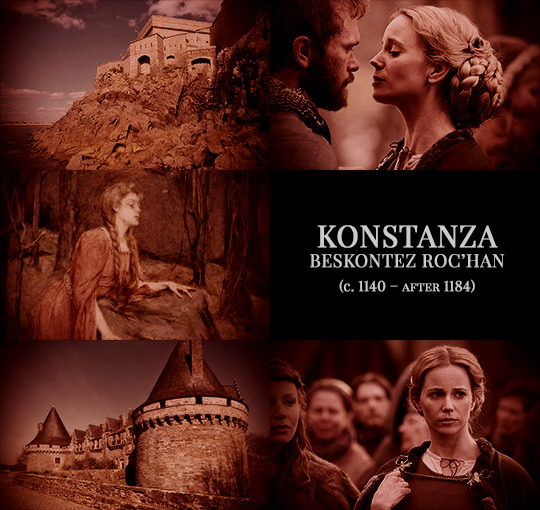
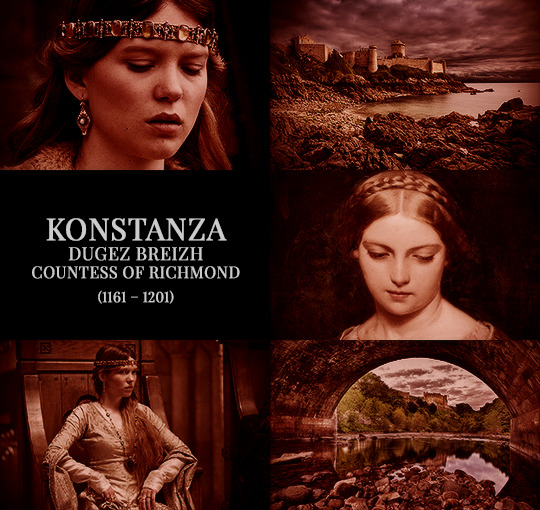

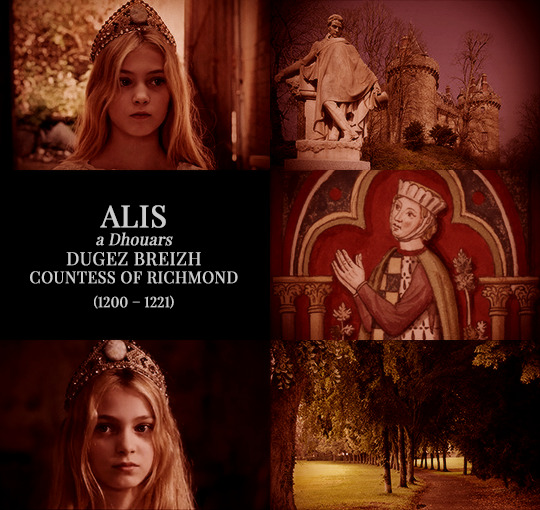
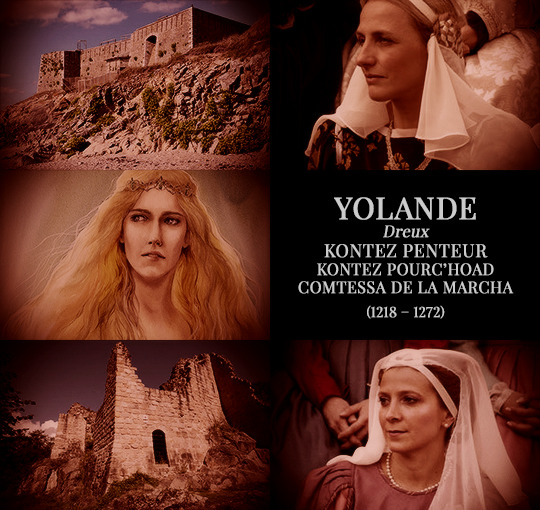

Daughters of the Breton Dukes, part I
Judit, duchesse de Normandie. Daughter of Konan Iañ and Ermengarde-Gerberge d’Anjou. Mother of Aélis de Normandie, comtesse de Bourgogne and Aénor de Normandie, comtesse de Flandre. Grandmother of Adélaïde de Normandie, comtesse d’Aumale.
Hawiz, dugez Breizh. Daughter of Alan III and Berthe de Blois.
Berta, dugez Breizh. Daughter of Konan III and Maude FitzRoy. Mother of Konstanza Breizh, beskontez Roc’han and Enoguen Breizh, abbesse de St. Sulpice.
Konstanza, beskontez Roc’han. Daughter of Berta and Alan Penteur, 1st Earl of Richmond.
Konstanza, dugez Breizh. Daughter of Konan IV and Margaret of Huntingdon. Mother of Eleonora Breizh, the Fair Maid of Bretagne and Alis a Dhouars, dugez Breizh.
Eleonora, Countess of Richmond. Daughter of Konstanza and Geoffrey of England.
Alis, dugez Breizh. Daughter of Konstanza and Guy de Thouars. Mother of Yolanda Breizh, kontez Penteur.
Yolanda, kontez Penteur. Daughter of Alis and Pierre Mauclerc de Dreux. Mother of Alais de Lusignan, Countess of Gloucester; Marie de Lusignan, Countess of Derby; Isabelle de Lusignan, dame de Belleville; and Yolande de Lusignan, dame de Preaux.
Alis, comtesse de Blois. Daughter of Yann Iañ and Zuria Nafarroakoa. Mother of Jehanne de Châtillon, comtesse de Blois.
#bretagne#house of dreux#historyedit#french history#european history#women's history#history#royalty aesthetic#nanshe's graphics#medieval#bretoned
72 notes
·
View notes
Text
Hey @slytherinsiriusblack ! I saw that you wanted french wolfstar’s AU to read, so I made this one about Sirius telling his french trip to Remus (entirely in French !) I hope you will enjoy it !
Rémus : t’es déjà allé en France au moins ?
Sirius : oui, une fois. Tu me connais, j’aime voyager. Mais ce n’était pas une partie de plaisir, j’y étais avec ma famille. Pour des funérailles. Une vieille tante assez éloignée qui est morte de vieillesse, et surtout d’ennuis. On est allé l’enterrer au Père Lachaise, tu vois le genre.
Rémus, avec un sourire : sans vouloir t’offenser je suppose que tu ne tenais pas beaucoup à cette vieille tante ?
Sirius : oh que non ! Elle était acariâtre, raciste et coincée, comme les autres. Non, Paris m’a rendu triste pour une autre raison.
Rémus : pourquoi donc ? C’est tout de même l’une des plus belles villes du monde.
Sirius, passant une main dans ses cheveux, avec un léger rictus : j’espère que ça ne va pas paraître ridicule mais... vous me manquiez. Les Maraudeurs. Pourtant on se connaissait à peine ! J’ai dû me rendre en France alors qu’on était en première année, tu vois c’était il y a longtemps. Le début de notre amitié, de toute cette folle histoire, et de toutes nos aventures... Et là-bas, en France, j’avais que mes yeux pour pleurer et Régulus pour me demander l’air soucieux si papa et maman m’avaient encore tapé sur la gueule. « Sirius attache tes cheveux », « Sirius parle français correctement je te prie », « Sirius cesse de caresser ce chat », « Sirius tu nous fais honte tais-toi ». Je ne me suis jamais vraiment entendu avec mes parents, ce n’est pas un secret, mais je venais juste de rejoindre Gryffondor et c’était le pire des déshonneurs pour des gens comme eux que d’avoir un fils qui n’était pas à Serpentard. Mais bref tout ça pour dire que pendant une semaine je me suis retrouvé tout seul, coincé entre quatre murs avec des gens qui se disaient être de ma famille et qui pourtant me détestaient, dans un pays qui n’était pas le mien, forcé d’assister à l’enterrement d’une vieille carne que j’avais dû voir trois fois dans ma vie. C’était morose, déprimant, glauque. Comme à chaque fois que je suis coincé avec les autres Black. J’étouffais sans vous. Et tu sais à quel point j’ai toujours besoin d’être dehors... mais nous étions confinés dans une sinistre demeure, obligés de rester à table pendant des heures à écouter déblatérer de vieux oncles sur les actes de bravoure des Mangemorts. Réunion de famille quoi. C’était horrible. Pourtant un jour j’ai réussi à m’échapper quelques temps... et j’ai vu Paris. C’était grandiose Rémus, grandiose ! Je t’emmènerai à Paris un jour. C’est trop beau pour que tu ne le vois pas.
Rémus, en riant : mes ancêtres étaient irlandais, je peux t’emmener à Belfast en échange !
Sirius, avec passion : mais j’en serai ravi ! Les voyages et l’amour, c’est tout ce qui compte vraiment. Mais vois-tu mon doux Rémus la France ne se résume pas à Paris, et même si je me trouve bien chanceux d’avoir pu admirer quelques splendeurs parisiennes, je pense que le reste de la France est à voir aussi. J’aimerai voir la mer en France. Et la campagne aussi, ces petits villages français que tout le monde oublie, mais qui ont tellement de charme. Les montagnes et les bois, la vieille pierre et le soleil au zénith sous les chants des grillons ! De la Bretagne à la Corse ! J’aime la France, et si j’avais pu la voir autrement que sous la tyrannie des Black j’aurai été le plus heureux des garçons. Mais les choses étaient bien différentes... Mes fidèles amis n’étaient pas avec moi, et j’ai eu droit à quelques sorts de torture après ma rapide escapade clandestine dans les rues de Paris... donc oui Rémus, je suis déjà allé en France, mais les événements ont fait que je n’ai pas pu la voir dans toute sa splendeur, avec toutes ses nuances.
Rémus, avec un sourire : on ira un jour Sirius, on ira.
#harry potter#wolfstar#sirius black#remus lupin#au#gryffindor#slytherin#france#french#paris#slytherinsiriusblack#request
29 notes
·
View notes
Note
Hi! I'm not familiar with high medieval history but seeing your posts have made me super interested in certain historical figures of 11th century Brittany (specifically Hawise of Normandy, Bertha of Blois and Hawise of Rennes!!! Icons, all three of them)
It's really difficult to find information on their personal lives tho, so I wanted to ask: What kind of marriages did Geoffrey of Rennes & Hawise of Normandy and Hawise of Rennes & Hoel II have? I know that Bertha and Alan's seems to have been very loving, but I can't figure our anything for the other two.
Maybe I'm searching in the wrong places, so if there are any specific books that elaborate on them, please recommend! Thanks :)
Hello!
Thanks so much <3 and I agree! Those three lived in a really interesting period and their lives add really interesting context that I think makes them compelling to learn about :)
Unfortunately, historical evidence surrounding 11th century Brittany has a lot of gaps and omitted/lost information that makes it hard to tell for sure what certain relationships would have looked like and a lot of it has to be reconstructed with best guesses with the limited information we have.
I can only speak for what I've read, so if anyone has more resources or info they'd like to share feel free!
Regarding Hawise of Normandy and Geoffrey I, we don't really know a whole lot about their relationship as they were married in 996 and Geoffrey died in 1008 on pilgrimage to Rome. Joëlle Quaghebeur brings up an interesting angle regarding the double marriage of Hawise and Geoffrey and Richard II to Judith of Rennes as having marked differences in culture between the Bretons and Normans that affected how the two regions viewed the alliance, and my speculation is that it probably wouldn't be surprising if it bled into how the respective brides and grooms also viewed/interacted with each other.
We're given a pretty rosy image of their marriage: "This was the maiden, very beautiful in body and agreeable in morals and honesty: and why, after the paction of their friendships, Geoffrey asked that she be given to him, at Richard's will which Richard granted himself with agreeable courage and by assent of the Norman Princes gives her to him as a wife in the Christian manner." One of the difficult things about trying to figure even the events of the marriage though is that a lot of the finer details of it mostly come from Guillaume de Jumièges- a Norman chronicler- so we're left with a mainly one-sided narrative that is predisposed to the opinion that Normandy has suzerainty over Brittany which also needs to be taken into account when trying to parse things out. That being said, the marriage did do what it was intended to do: during Hawise's lifetime, Normandy and Brittany were bound in much closer defensive alliance against Anjou, so in that regard it's hard to consider it an unsuccessful one.
Some more resources on Hawise of Normandy:
Amy Livingstone, Pious Women in a “Den of Scorpions” The Piety and Patronage of the Eleventh-Century Countesses of Brittany
Joëlle Quaghebeur, Havoise, Constance, et Mathilde, princesses de Normandie et duchesses de Bretagne
Pierre Le Baud, Histoire de Bretagne, avec les Chroniques des maisons de Vitré et de Laval
Historical consensus on Hoël II and Hawise seems to be a lot more straightforwardly confident on calling it a genuinely affectionate marriage. Laurence Moal specifically mentions their marriage in her section on marriage dynamics within the ducal family as one offering the image of "perfect harmony". Hawise of Rennes was not as politically prominent as Hawise of Normandy was, so unfortunately we don't have much information on her specifically, but what we do have points to Hoël and Hawise having the typical experience of their time/status/region of marrying in their late teens or twenties and having a pretty good partnership.
I can't find hard dates for when Hoël and Hawise were born or when they were affianced, but it's likely that they married relatively young and there being no mention of Hoël having a concubine or illegitimate children, and he seems to have shown no inclination to take a mistress or remarry after Hawise's death. There is also the fact that Hoël seemed to have been deeply shaken by Hawise's death and the purpose of praying for her soul may have been one of the main factors motivating his decision to go on a pilgrimage to Rome in 1072.
More on Hawise and Hoël/Hoël's family:
Laurence Moal, Duchesses Histoire d'un pouvoir au féminin en Bretagne
Jean-Christophe Cassard, Houel, Huuel, Compte de Cornouaille puis duc de Bretagne (circa 1030-1084)
André-Yves Bourgès, Propagande Ducale, Rèforme Grégorienne et Renouveau Monastique
Joëlle Quaghebeur, La Cornouaille du IXe au XIIe siècle Mémoire, pouvoirs, noblesse
Joëlle Quaghebeur, Judith de Nantes, très pieuse, très noble, très sage comtesse de Cornouaille
If you're inclined to historical fiction, Hoël and Hawise also feature as side characters in The Wolf Hunt by Gillian Bradshaw
It's possible there may be sources I've missed, or new ones may come out later, so if you're still looking for things I recommend looking through the works cited of some of the above materials or seeing if someone else cited them. I apologize for the vagueness that is the middle ages, but I hope this was somewhat helpful!
2 notes
·
View notes
Link
0 notes
Text
Nantes 2018
As the final post of the French trilogy, Nantes comes as the final stop. Similarly to Dijon, this city was relatively foreign to me thus I didn’t really know what to expect, however it’s safe to say I was completely taken by surprise.
Once the home of Anne de Bretagne, the Château de Ducs de Bretagne is the centrepiece of the city with small streets laden with bars and restaurants which come alive in the evening stemming off from it. At night the castle springs into illumination with an intriguing light show highlighting the architectural complexity of the building which is reflected in the mirror lake just in front of the site.
Over the 3 days I was there I really enjoyed just wondering round the city somewhat aimlessly and I found it was the best way to discover the more hidden gems. I will absolutely be returning to Nantes in the future, mostly to revisit the gallery of Beaux Arts (which takes no.1 spot as the coolest museum I’ve ever been to) and the Machines de Nantes - a living art display with an enormous animatronic Elephant and Spider - really worth the visit. In the evening I took the €1 lift up to bar the top of the Tour de Bretagne and watched the sun set over the city with live music in the background and a glass of wine in hand.
My final stops in the city were spent between Le Passage Pommeraye and Le Cathédrale Saint-Pierre et Saint-Paul. Le Passage Pommeraye is a quaint and elegant arcade filled with small independent shops decorated with ornate decor throughout. I was really in awe by sheer enormity of the cathedral and it is by far the largest one I’ve ever visited with incredible stained glass windows and pillars which seemed to extend to infinity.
Finally, a fact about Nantes which I was unknown to, is that it served as one of the leading ports for the slave trade in the 1800s, and to commemorate the lives of those sold and lost during this awful time in history there is the very moving Slave Trade Memorial which sits on the banks of the Loire river and walks through the timeline of the slave trade and how Nantes was involved. A truly touching aspect of the city.
All in all, Nantes is a really amazing city with fantastic night and day life with an extensive history and the birthplace/home of French royalty and Nobel prize winners. I will never not recommend this place to anyone wishing to travel and discover the less touristy cities in France.
#travel#photography#photoblog#nantes#france#travel writing#photographers on tumblr#follow#like#reblog#share
3 notes
·
View notes
Photo

(Old pic cause I look like shit these days). J’ai été taggée par @lottiepompon pour un petit portrait questions/réponses, je suis au lit, je m’ennuie, c’est parti 😊 • Qui es-tu ? Lyra, 32 ans et des poussières, des crocs de chacal et un caractère de cochon, sorcière fouilleuse d’humus de mon état • Ton signe Astro ? Capricorne ♑️ ascendant Scorpion ♏️ (oui, je sais) • Ta carte de tarot ? La Tour/Maison Dieu • Ton métier ? Mon CV est un bol de porridge à lui tout seul. Études d’archéologie médiévale, instit pendant 5 ans, journaliste puis pionne en lycée et collège, aujourd’hui prof à domicile d’anglais et de français, et autrice si je croise les doigts (wannabe) • Tes passions ? La littérature, la musique, l’écriture, l’équitation, la botanique, les dinosaures, le cinéma, la musique, la théologie, les fêtes médiévales, la musique, le patrimoine culturel, les mythologies ... oh, j’ai parlé de la musique ? (pardon) • Fêtes païennes préférées ? Imbolc et (quelle originalité) Samhain • Ta pierre préférée ? Ma collection dit Labradorite, mon cœur dit Obsidienne noire. Disons que c’est celle qui me ressemble le plus. • Ta plante préférée ? En comestible, la Sauge, en toxique, la Digitale • Un livre ? Si je dis Le Seigneur des Anneaux je vais donner l’impression de radoter comme une vieille pie. Et j’ai déjà parlé de Stardust. Mais vous ai-je déjà parlé de L’Homme qui Rit, de Victor Hugo ? Un des livres qui a changé ma vie. • Un voyage bouleversant ? Hélas je n’ai pas beaucoup voyagé. Beaucoup de pays me font affreusement envie mais c’est compliqué. Je ne vais pas défriser un mouton irlandais, mais l’endroit qui fait battre mon cœur, depuis toute naine, c’est la Bretagne. • Des tatouages ? Yes sir. Eolh sur le poignet droit, mon sigil perso dans la nuque, une digitale sur l’avant bras gauche, une pie sur l’omoplate gauche, le monogramme de Tolkien sur l’avant-bras droit. Et d’autres en projet. • Animal ? (J’ai ôte totem, ce mot me gêne) La pie • Philosophie/Citation ? "Celui qui brise une chose pour savoir ce qu’elle est a quitté les chemins de la raison" Tolkien (et "les pattes de canaaaaaAAAAAAaaaard" Kadoc) (Suite en commentaire) https://www.instagram.com/p/Bvwcm7enbHC/?utm_source=ig_tumblr_share&igshid=12rzpx832k3j3
3 notes
·
View notes
Text
Nantes: My favorite places in my favorite city
Yesterday, I spent the day with my friend Laura, an au pair from Colombia that I met in my French class. Since Laura only arrived in Nantes several weeks ago, we decided that it would be a good idea for me to take her on a little tour of this incredible city. As the two of us were walking around on an unseasonably warm and sunny February day, I was reminded of why I find this city so beautiful and why it’s so special to me.
I loved seeing the look of awe on Laura’s face as we explored all of Nantes’ wonders, and it reminded me so much of what it was like to set foot in this city for the first time. When I first moved here, this city absolutely terrified me. I, a girl from a small town in Massachusetts, initially felt uneasy around all the hustle and bustle. The whirling and crowded city felt so alien and foreign to me, and at first, I feared that I would never adjust. However, I could not have been more wrong. After some initial hesitation, I fell in the love with Nantes; and when I fell, I fell hard and fast. This city has taught me so much about the beauty of embracing your fears and welcoming the unknown into your life.
I may not be a born-Nantaise, but within the past few months, this city has become my home. Before I found my host family last April, I had never even heard of this place. Now, several months later, I can’t imagine my life without it. Since I moved here, this city has come to mean so much to me and had become very dear to my heart. Perhaps it’s because of the city’s stunning architecture or rich culture and history. Perhaps it’s because of its bustling, vibrant nature or its abundance of places to explore and things to do. Maybe it’s because last year, this city welcomed me with open arms and made me feel a sense of belonging, even though I was thousands of miles away from everything I had ever known. It might be because this city has been the setting of many of my firsts, and has been the backdrop to so many new experiences and adventures. Perhaps it’s because I have found a family here and have created strong friendships that I know will last a lifetime. Maybe it’s because my friends and I have made memories in every corner of this city, or because I can’t look at a single thing in this place without being reminded of happy memories and feeling a wave of bittersweet nostalgia. It breaks my heart to know that I will have to leave this city one day, but I am comforted by the knowledge that I will certainly be back to Nantes to visit many times in the coming years. Who knows, maybe this city is where I’ll raise my children one day; I love the sound of that.
As you can see, Nantes is without a doubt one of my favorite cities. Of course, I know that I’m quite biased on this, but there are so many reasons to love this place. I highly recommend this destination to any and all travelers; I bet that you’ll come to love this city just as much as I do.
Still not convinced? Let me tell you about my favorite places in Nantes, and I’m sure that by the time you finish reading this, you’ll be on Skyscanner booking a flight.
1) Le Château des Ducs de Bretagne
How incredible is it that I walk by an actual castle every day on my way to French class? This castle is a must-see for any travelers visiting Nantes. You can walk around the courtyard on the inside, have a picnic on the grass on a sunny day, walk around the wall of the castle and be rewarded with a beautiful view, or even go down the slide attached to the side of the structure! Just across the tram tracks lies The Water Mirror. During the summer, lots of people love coming here to splash in the fountain or sunbath on the nearby grass. But, when the water is completely still, you can see a beautiful reflection of the castle in it. Within the castle, there are two museums: Le Musée d’Histoire Urbaine and another museum for temporary expositions. Several weeks ago, some friends and I went to an exposition called “Cimarron,” which was a colorful, beautiful, and moving contemporary photography exhibit.





2.) Le Musée des Beaux Arts
If you love art or just enjoy museums, be sure to check at Le Musée des Beaux-Arts. The best part? On the first Sunday of each month, the majority of museums in Nantes are totally free of charge!
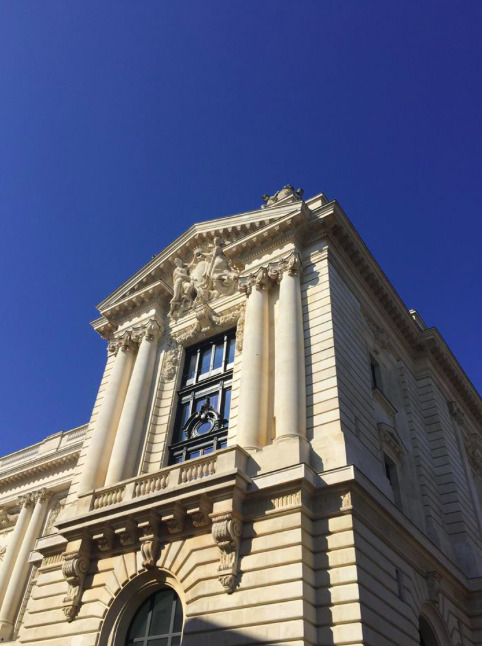
3.) La Cathédrale Saint-Pierre-et-Saint-Paul de Nantes
The architecture of this cathedral is nothing short of stunning! This was one of the first places in Nantes that I visited with my host family when I arrived, and it was also the place that my friend Ellie and I used as our meeting spot the first time that we met up, so the thought of the cathedral and the memories I’ve made there always brings a smile to my face.
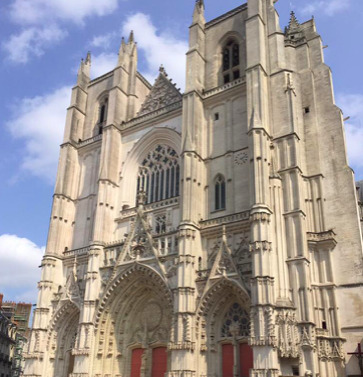

4) Le Jardin des Plantes
Le Jardin des Plantes is easily my absolute favorite place in Nantes. I could write pages about why I love it so much. This beautiful botanical garden, which is open to the public free of charge, is complete with a playground, walking trails, a cafe, greenhouses, flower and herb gardens, lots of trees, fountains, sculptures, lots of birds, a merry-go-round, and even a goat petting zoo. The garden is absolutely gorgeous; filled with brightly colored blossoms and greenery everywhere, it’s like a little slice of paradise. When the weather is nice, it’s my favorite place to go for a walk, have a picnic with friends, grab a pain au chocolat at the nearby boulangerie and sit in the sunshine, or find a shady bench to read or journal. Au Pair Super Tip: This is the perfect place to take your host kids! They’ll love the playground, the merry go round, and the petting zoo, and walking around here is a great way for the kids to play outside and get some exercise.


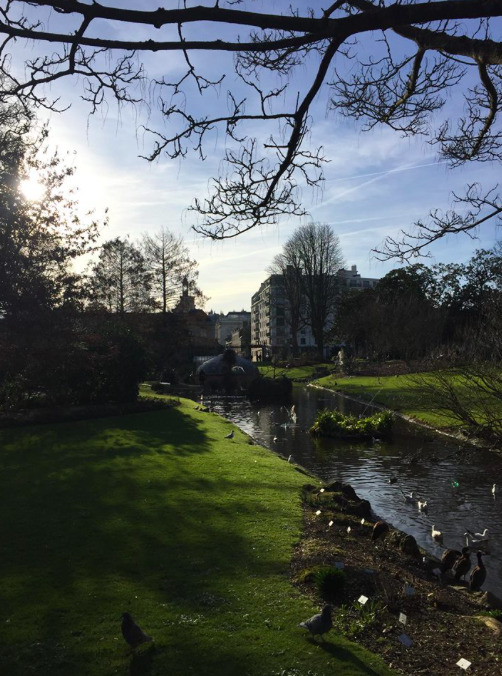
5) Shopping
Nantes is the perfect city for those who love to shop. There’s an abundance of chic fashion stores, vintage shops, and adorable boutiques. When visiting Nantes, be sure to check out Le Passage Pommeraye, a beautiful shopping center built in the 1800s.
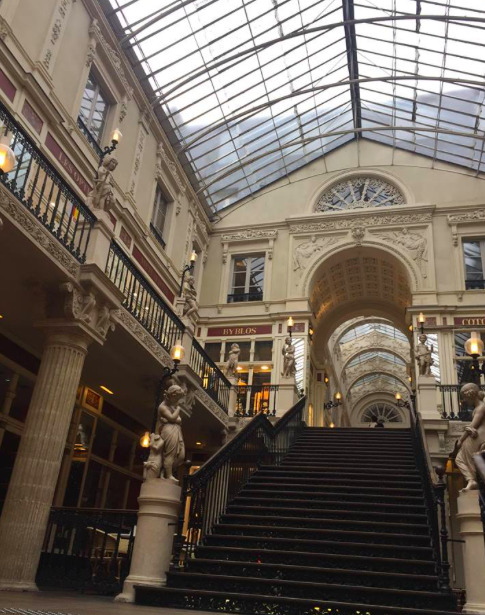

6) Restaurants:
In Nantes, there’s certainly no shortage of great cafes and restaurants. Looking for a delicious croissant, baguette, or macaron? You can find all that and more in one of the many different boulangeries or patisseries. On the search for a crêpe or a galette? In any city in the Brittany region, you’re sure to find tons of creperies. Want to grab coffee with a friend and spend hours chatting in a cute café? Try Le Select, a great cafe with a vintage vibe, or La Maison d’Elise, a cat cafe. Yes, a cafe that doubles as a cat shelter! (How adorable.) Even if your searching for healthy, vegan food, Nantes has you covered! In fact, two of my favorite places in Nantes or the TreeHouse, a vegan café/grocery store, and Totem, an incredible vegan restaurant with the most amazing vegan desserts I’ve ever had.


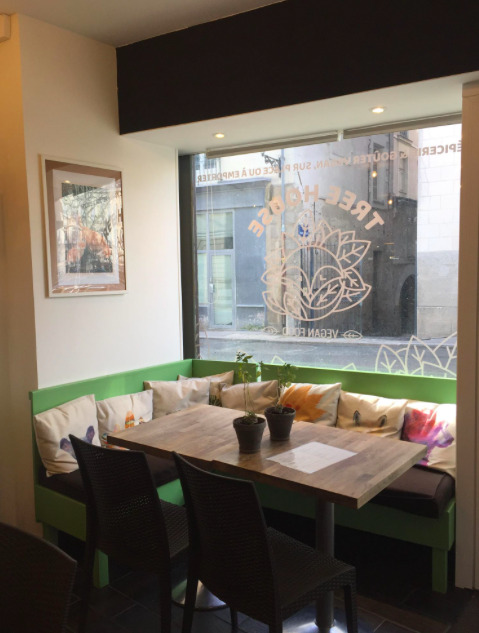
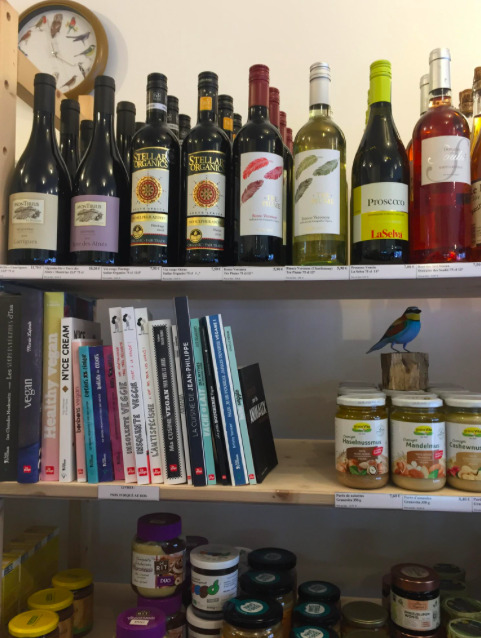
7) Le Jardin Japonais
If you’re looking to find some more nature when in the city, look no further than Le Jardin Japonais (The Japanese Garden) located on L’ile de Versailles. Filled with red maple trees, walking paths, streams, bamboo plants, and even rocky waterfalls, this little garden is another great place to spend a sunny, Autumn day.

8) Architecture:
I have to say, I love the architecture in the Bretagne area, especially here in Nantes. Whenever I’m walking around the city, I can’t help but look up to stare at the buildings around me. I mean, just look at how pretty these buildings are! Whether it be in Nantes, Paris, or Toulouse, my favorite part of French architecture are the balconies that adorn the historic buildings.
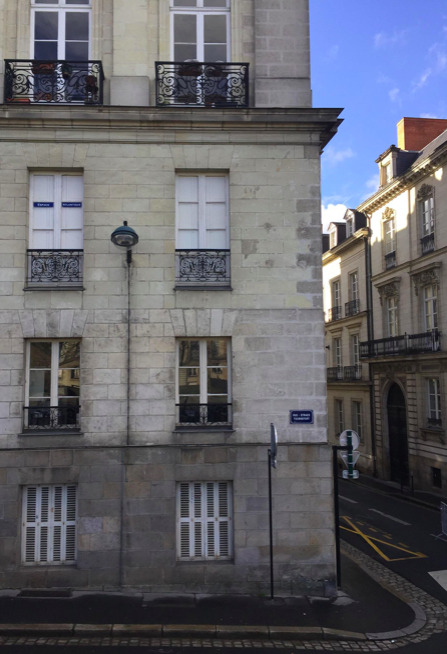
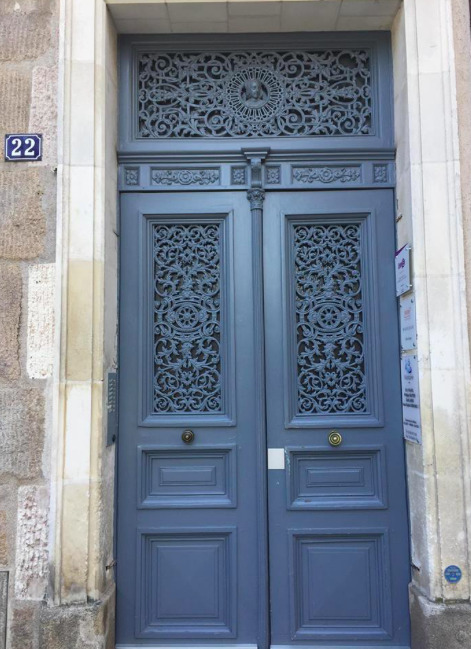
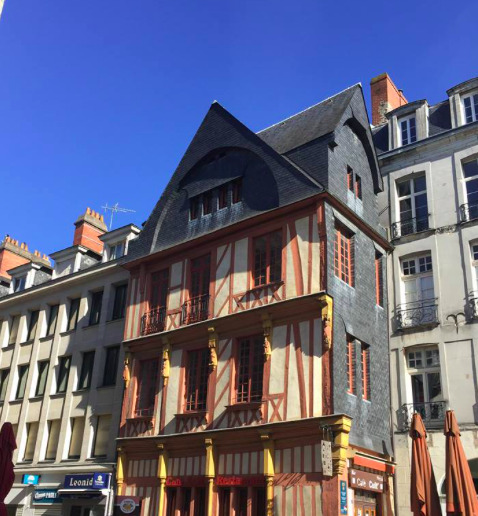

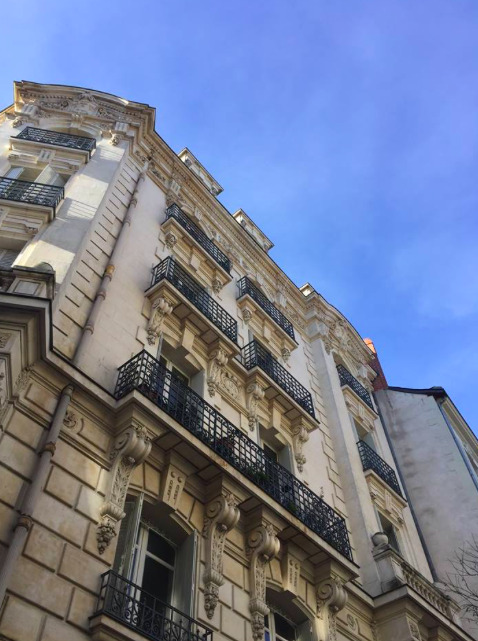

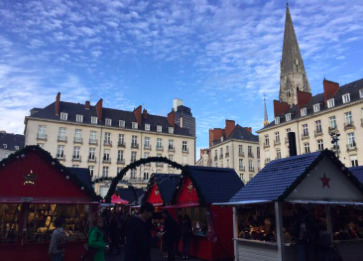
9) Les Machines de l'île
“The Machines of the Isle of Nantes” is an artistic exposition located in the former shipyards of Nantes. Several artists created many different gigantic, robotic animals. The most famous of these robotic works of art is the Elephant, a 12-meter high creation that passengers can climb aboard and be taken on a 45 ride around the area. Just watch out: The Elephant will spray water from its trunk when you least expect it! (Take it from my host kid; who got absolutely drenched the last time we visited.)
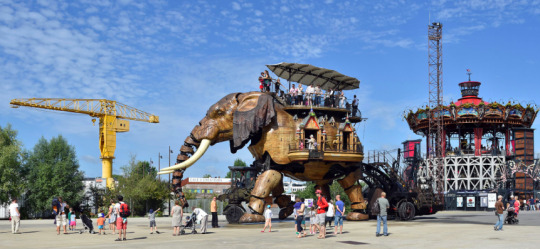
10) Le Lieu Unique
One of the coolest places in Nantes is the Lieu Unique. While the building actually used to be a factory for the French biscuit brand LU, it now serves as a location for a vibrant cultural center with an abundance of things to do. Visitors can eat in the cafe or restaurant, shop in the bookstore, grab a drink in the bar, get a massage or relax in the sauna in the spa, see a contemporary art exposition, or go to one of many different performances, concerts or live music events.
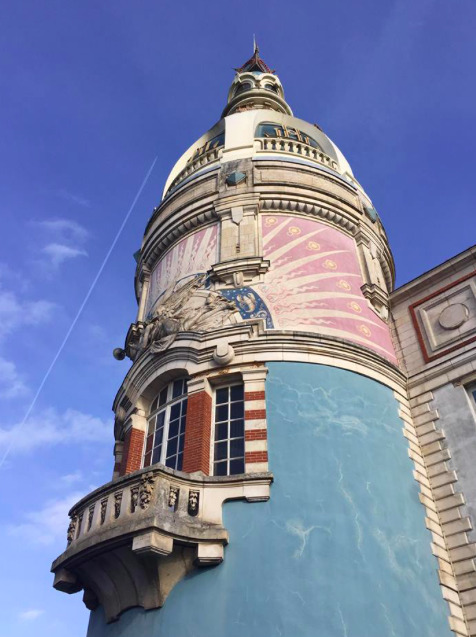

11) Le Tour Bretagne
One of my absolute favorite places in Nantes is the Tour Bretagne. While it may just look like a skyscraper filled with administrative offices from the outside, this tower has a secret: For one euro, you can ride the elevator to the top floor (over 30 stories high!). There, you’ll find a funky, bird-themed bar called “Le Nid” (“The Nest”), which is one of my favorite places to go out with friends. After getting a drink and hanging out in one of their egg-shaped chairs, you can go out on the balcony and see the most incredible view of Nantes. Whether you see it during the day, as the sun is setting, or late at night, this view is always sure to stun. From the top of this tower, you can see the entire city from a bird’s eye view, which makes all the buildings (Even the cathedral!) look tiny enough to be doll furniture. I love spending time on the balcony and looking out over this city, as it reminds me about why this beautiful city is so special to me, the countless memories I have made here, and why love Nantes so fiercely.

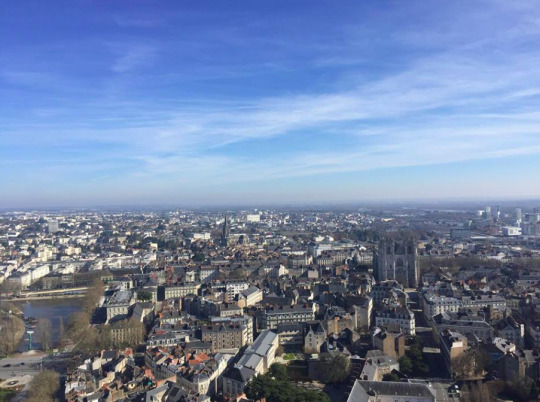
1 note
·
View note